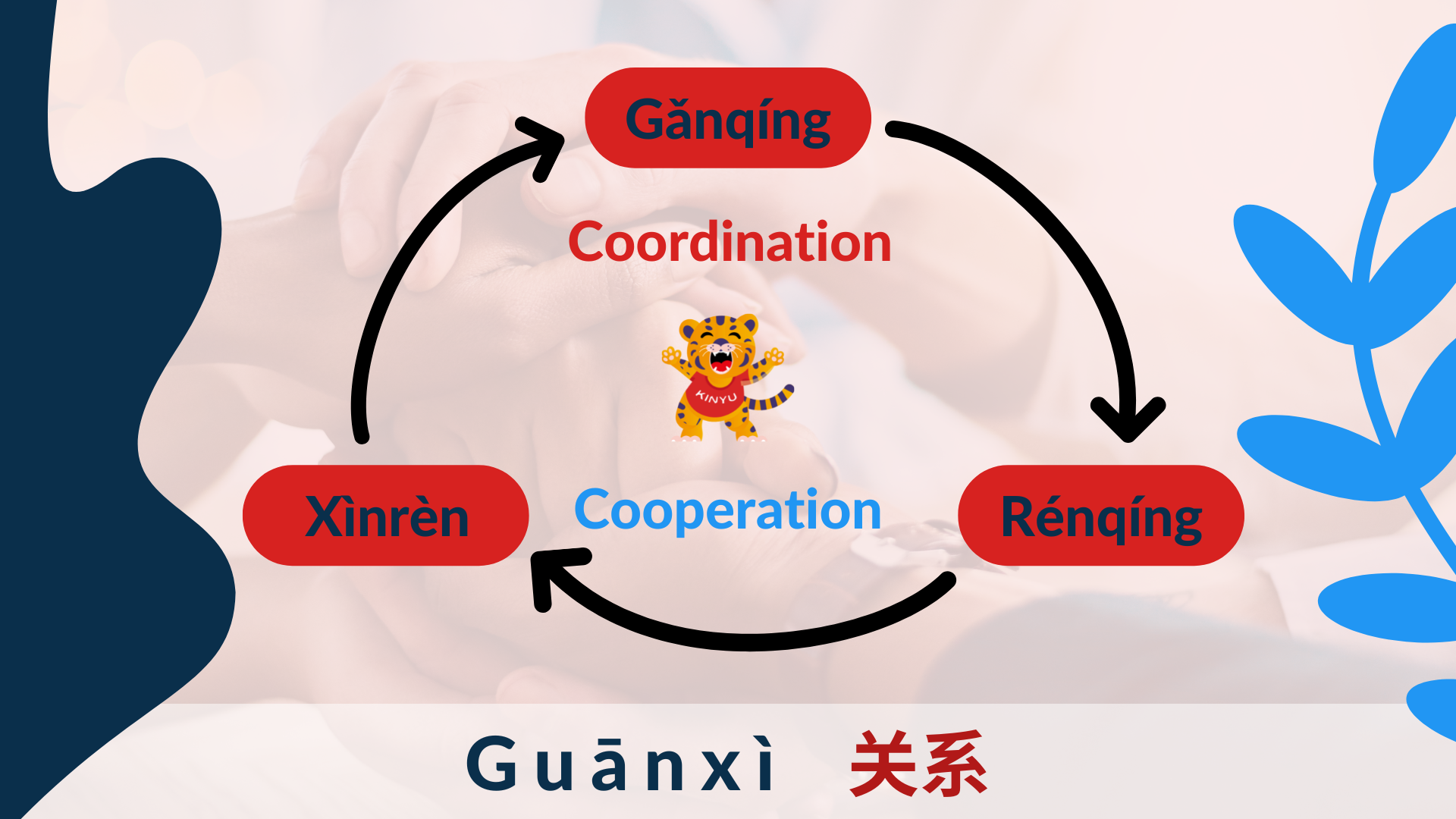We recently posted a blog about how your conduct can profoundly impact your ability to succeed within the Chinese market. Something else that we touched on is the need to be acutely aware of your Guānxì. No cheat code unlocks strong Guānxì ties- it is a continual process, and you must be mindful of it at all times, especially when embedding yourself within Chinese culture.
Guānxì is the very crux of how people engage and interact with one another in China, and understanding it could make or break your success. As such, we have explored the three crucial components of this age-old concept and outlined them throughout this blog to help you better understand its ongoing application when conducting business transactions with Chinese counterparts.
As a reminder, Guānxì is one of the (if not THE) most notable dynamics in Chinese culture, meaning it is deeply woven in the fabric of the country and its people and transcends all areas of life, including business! It is the framework in which millions of people operate and is absorbed into the business culture of both macro-economy and micro-business as readily as you and I breathe.
Guānxì is like an onion, with layers of complexity that take time and effort. As such, it is paramount for you and your team to focus on these three crucial elements of the Guānxì phenomenon:
Gǎnqíng 感情
Definition: Gǎnqíng means “feel” or “affection”, and together the term is often translated as “feelings” or “emotional attachment”. Gǎnqíng refers to the friendship-like feelings that develop between two people, groups, or business partners as their relationship deepens. Gǎnqíng is essential to social relations in Chinese culture that has roots in Confucianism and is a sub-dimension to the principle of Guānxì (a person’s relationship network).
From a Western perspective, this term refers to the affection and emotional bonding built between individuals as they walk a particular journey together. Developing Gǎnqíng often comes from social interactions – having dinner with your partners/colleagues, celebrating a birthday or a graduation – perhaps even a successful business deal. Within a western working environment, a team-building day out could be considered a method to develop Gǎnqíng. These touch points all contribute to building Guānxì.
So to reiterate: good Gǎnqíng is the first pillar for building good Guānxì.
Rénqíng 人情
Rénqíng is a phenomenon that can easily be misunderstood when translating between east and west. In a nutshell, it could be regarded as the exchange of favours and gifts. However, this immediately brings with it a whiff of corruption, which is so often attributed to business in China. However, the exchange of Rénqíng is not as tangible and transactional as this. Rénqíng is extending your time, resources, credit or effort for the benefit or sake of another. When you travel to China to visit your suppliers, this can be seen as Rénqíng – as you are making the effort, spending time and money to go visit them, for the sake of the business relationship.
If you stick your neck out for a colleague, share the burden of a project or stay late to solve a problem – this can be considered Rénqíng. Chinese people recognise the effort others put into a relationship – which is why you may find your suppliers/partners so accommodating and kind when you are visiting them. People will go to great lengths to help, in order to build Guānxì. When it comes to money, Rénqíng can be something as simple as getting the bill for a meal. It’s more the gesture than the amount.
A key factor in Rénqíng is that this is often attributed personally. It is a peer-to-peer phenomenon, rather than a business-to-business phenomenon. This is why you always hear people talk about the relationships an individual might have. If we were to put this into a Western context, the closest element would be stakeholder management within an internal structure. Those within a big corporate organisation could deploy Rénqíng to develop key internal relationships, deliver projects successfully and thus move up the corporate ladder.
Remember the company we touched on in Part 1, where an American manufacturer relocated a senior director to the Chinese city of Guangzhou. This manufacturer orchestrated the move to improve the company’s topline whilst simultaneously cutting costs. The director knew this was a make-or-break situation for his career and had some Chinese cultural experience due to previous trips. However, despite trying to learn the language and learn from previous interactions, he failed to onboard the overall concept of building good Guānxì for himself.
This oversight meant he could not meet his team and suppliers’ expectations, often over or undershooting and, as such, missing the opportunity to build rapport and trust with key players, quickly leading to a drop-off in success.
As this story shows – the consistent display of Rénqíng is important, especially when a project meets challenges.
Xìnrèn 信任
It quite simply means ‘trust’.
As in the west, trust is built through knowledge and experiences. People want to know who you are and where you have come from. People also like to see proof in your abilities through actions. Kinyu CEO Benjamin King has found that ability and integrity both contribute towards a strong business relationship. You may have faith in someone’s integrity and that they will not cheat you, but that cannot replace your faith in their ability and availability to do the job at hand. Especially in China, integrity and ability must come hand in hand.
So how does this fit into Guānxì?
Guānxì Bases
There are certain Guānxì bases in which you can develop your trust in someone’s integrity. These vary in strength – family relationships provide the most trust, followed closely by school/childhood friends. School friends has a particular importance more recently in China, the One Child Policy meant many children did not have siblings. Cousins are treated as siblings and close childhood friends are treated like family.
Other Guānxì bases can be university alumni, current and former work colleagues – these bases highlight a similar background and also shared experiences. Even though you may not have been at university at the same time – the shared experiences and memories provide one another with a strong connection.
Hailing from the same town/province can be a Guānxì base, especially if it is far away. Local business chambers also act as a Guānxì base, as chambers tend to have a good screening process for their members. Although Guānxì is personal, it is also transferable, where introductions within Chinese society are extremely important as a Guānxì base.
Knowing me, Knowing you
To quote Abba, (or Alan Partridge for those in the UK!) you will find that people are very direct with personal questions in China. How old are you? Are you married? Do you have kids? Where do you come from?
This is all part of getting to know you – and is the form of developing trust. This is often at dinners and intertwined with Gǎnqíng.
Working together on projects, and developing Rénqíng is the other part of Xìnrèn. This shows your ability and willingness to work together.
To summarise, Xìnrèn is built through knowledge and action: integrity and ability.
Coordination and Cooperation
Everyone talks about the importance of Guānxì – but what are the tangible benefits of this? This all boils down to Coordination and Cooperation. Closer working relationships through Gǎnqíng and Rénqíng results in improved coordination on a project. This would be faster responses, better solutions, clearer and earlier communication of problems. Rénqíng and Xìnrèn result in stronger Cooperation: buy-in from senior people within the organisation, ability to communicate your commercial requirements and willingness to solve problems together.
Overall this will lead to better supplier performance and satisfaction – key goals with your vendor management strategy.
Visit our Blog page for more articles on Guānxì, supply chain and HR tips in China!
To understand how Guānxì will impact your business success within China, book a consultation with Ben, CEO of Kinyu Supply Chain Management, by using this link.



